In a fast-paced world where stress, fatigue, and cognitive overload seem almost inevitable, many people reach for caffeine as a quick fix. However, a growing body of research suggests that the best way to take caffeine is not simply about consuming more, but about understanding how caffeine interacts with the body, mind, and, intriguingly, with adaptogenic herbs and mushrooms. While the stimulating effects of caffeine are well-documented, its nuanced role in promoting stress relief and supporting the adaptogenic system is less widely known but no less critical.
The best way to take caffeine involves balancing its energizing properties with the body’s natural stress responses. This is especially relevant for individuals seeking not just a mental edge but sustainable energy, emotional equilibrium, and physical resilience. The combination of caffeine with adaptogenic substances offers an innovative pathway toward achieving calm focus, stable energy, and robust health. From timing and dosage to the quality and source of caffeine, the methods of consumption are more sophisticated than ever. And when paired intelligently with adaptogenic mushrooms such as reishi or lion’s mane, caffeine transforms from a simple stimulant into a synergistic tool for holistic well-being.
You may also like: Unlock Powerful Stress-Relief with Adaptogenic Mushrooms and Stamina Herbal Support
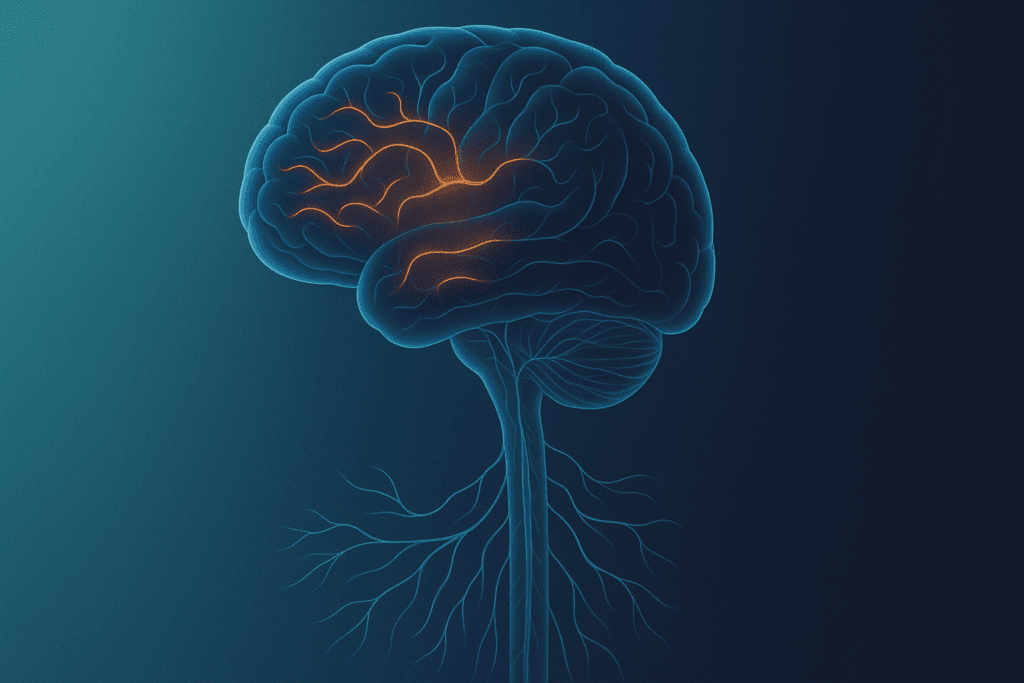
Understanding the Physiology of Caffeine and Its Impact on Stress
Caffeine, a naturally occurring compound found in various plant sources such as coffee beans, tea leaves, cacao, and guarana berries, primarily works as a central nervous system stimulant. It achieves its stimulating effects by antagonizing adenosine receptors in the brain. Adenosine is a neurotransmitter that promotes relaxation and sleepiness, and by blocking its activity, caffeine increases the release of excitatory neurotransmitters like dopamine and norepinephrine. This biochemical shift enhances alertness, mood, and reaction time.
However, caffeine’s interaction with the nervous system does not stop at stimulation. At high doses or with prolonged use, caffeine can trigger the hypothalamic-pituitary-adrenal (HPA) axis, increasing cortisol levels and potentially exacerbating stress. This duality makes the context in which caffeine is consumed extremely important. For instance, consuming caffeine on an empty stomach or late in the day may lead to jitteriness, anxiety, and disrupted sleep, all of which are counterproductive to stress relief.
Furthermore, the way caffeine affects the body varies significantly based on genetic predisposition, metabolic rate, and lifestyle factors. Some individuals metabolize caffeine quickly and benefit from prolonged energy, while others experience rapid spikes and crashes. Understanding these differences is crucial in determining the healthiest caffeine intake strategies.
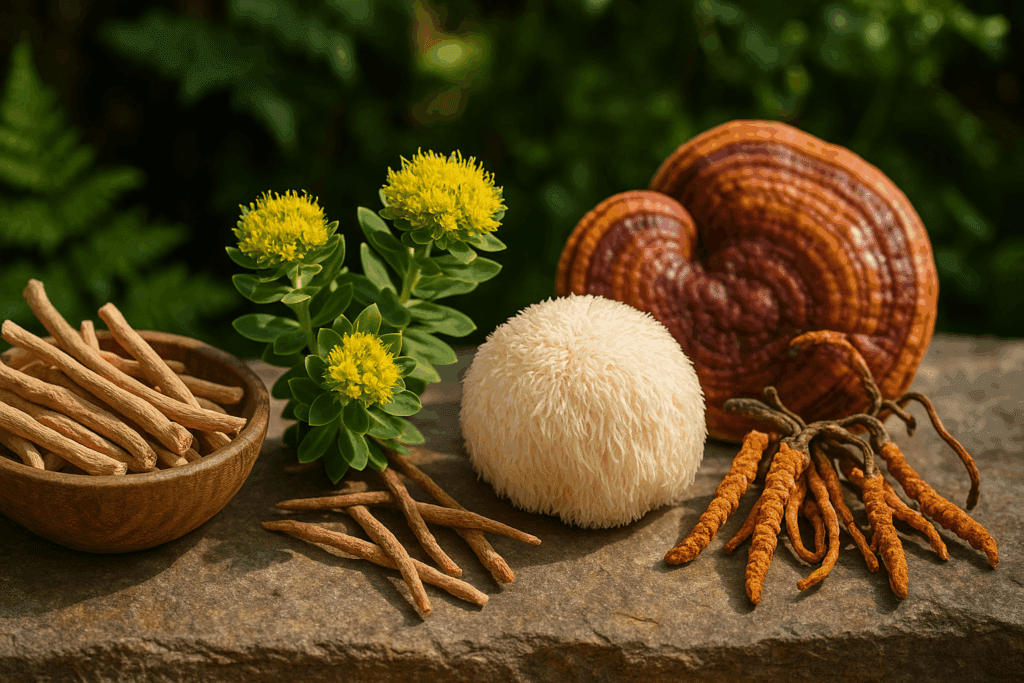
Integrating Adaptogens: Nature’s Answer to Modern Stress
Adaptogens are a class of natural substances, primarily derived from herbs and fungi, that help the body resist and adapt to stressors. Unlike conventional stimulants, adaptogens modulate physiological responses without overstimulation. They support the HPA axis and balance key hormones like cortisol, thereby enhancing resilience and maintaining homeostasis.
When used alongside caffeine, adaptogens can smooth out its stimulating effects, prolong its benefits, and mitigate the potential downsides such as anxiety and energy crashes. Popular adaptogens like ashwagandha, rhodiola rosea, and ginseng work synergistically with caffeine by supporting adrenal function and boosting stamina. Adaptogenic mushrooms such as lion’s mane, reishi, and cordyceps are particularly noteworthy for their nootropic and immune-modulating effects.
The symbiosis between caffeine and adaptogens provides a compelling approach to energy management. Instead of riding the rollercoaster of hyper-stimulation and subsequent fatigue, users experience a more grounded and enduring form of vitality. This balance is especially critical for those facing chronic stress, high cognitive demand, or burnout.

The Best Way to Take Caffeine for Energy Without Stress
The best way to take caffeine involves not only choosing the right form but also combining it with adaptogenic support. For example, starting the day with a moderate dose of caffeine from a healthy source like matcha or yerba mate, rather than high-sugar energy drinks or coffee loaded with artificial creamers, sets a gentler tone for the nervous system. These natural caffeine sources offer slower-release energy and are often rich in antioxidants.
Combining caffeine with adaptogenic mushrooms is another powerful strategy. A morning tonic made with lion’s mane and matcha, for instance, offers clarity, focus, and cognitive enhancement without overstimulation. The beta-glucans in lion’s mane support brain health and neurogenesis, providing long-term cognitive benefits. Similarly, cordyceps can improve oxygen utilization and energy metabolism, making them ideal for physical performance and endurance.
Timing is also essential. Consuming caffeine within 90 minutes of waking aligns with natural cortisol rhythms and minimizes sleep disruption. Conversely, late-afternoon consumption can interfere with melatonin production, leading to insomnia and heightened nighttime anxiety. Dosage should also be mindful—200 mg to 400 mg of caffeine per day is generally considered safe for most adults, but splitting this into smaller, strategically timed doses is often more effective.
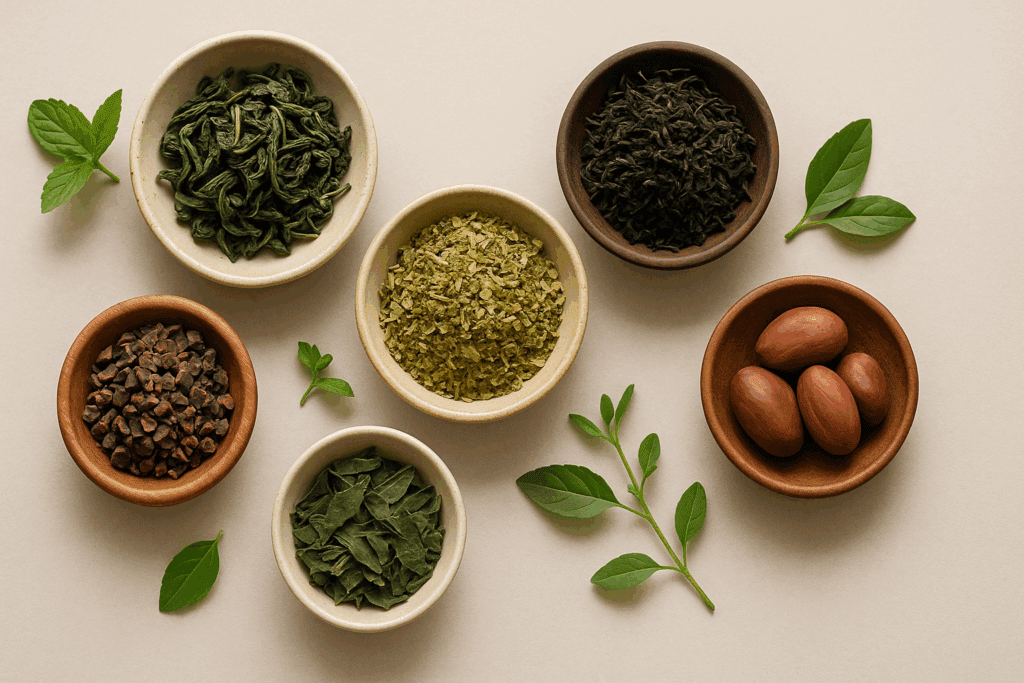
Exploring the Best Sources of Caffeine Other Than Coffee
While coffee remains the most popular caffeine source, it is by no means the only one. In fact, exploring caffeine sources besides coffee opens the door to healthier and more adaptive choices. Green tea, black tea, yerba mate, guayusa, and cacao offer varying levels of caffeine along with beneficial polyphenols, amino acids, and antioxidants that modulate the stimulant’s effect.
Yerba mate, for instance, contains a mix of caffeine, theobromine, and theophylline—compounds that offer a balanced stimulant profile with mood-enhancing properties. Guayusa, another South American leaf, delivers caffeine with fewer tannins, resulting in a smoother taste and digestion. Cacao, in its raw form, offers modest caffeine levels alongside flavonoids and magnesium, supporting cardiovascular and cognitive health.
These drinks with caffeine other than coffee are often less acidic, easier on the digestive system, and less likely to produce the jittery side effects commonly associated with espresso or drip coffee. For those seeking healthy caffeine intake, these alternatives represent a gentler and more sustainable approach.
Best Way to Take Caffeine for Powerful Cognitive Support
Beyond physical energy, caffeine is also widely recognized for its cognitive-enhancing effects. It improves memory consolidation, reaction time, attention span, and even mood. However, the best way to take caffeine for these benefits is to combine it with other nootropics or adaptogens that support brain health without creating dependency or fatigue.
Lion’s mane is a standout adaptogen in this regard. Its active compounds—hericenones and erinacines—stimulate nerve growth factor (NGF) production, essential for neuroplasticity and brain function. When paired with caffeine, lion’s mane can amplify focus, creativity, and information retention. This makes it ideal for students, professionals, and anyone engaging in mentally demanding tasks.
Rhodiola rosea is another valuable companion. Known for its anti-fatigue properties, rhodiola enhances mental clarity, reduces brain fog, and buffers against cognitive fatigue. It complements caffeine by sustaining mental performance without causing overstimulation. Together, they offer a balanced nootropic stack that supports both immediate focus and long-term brain health.
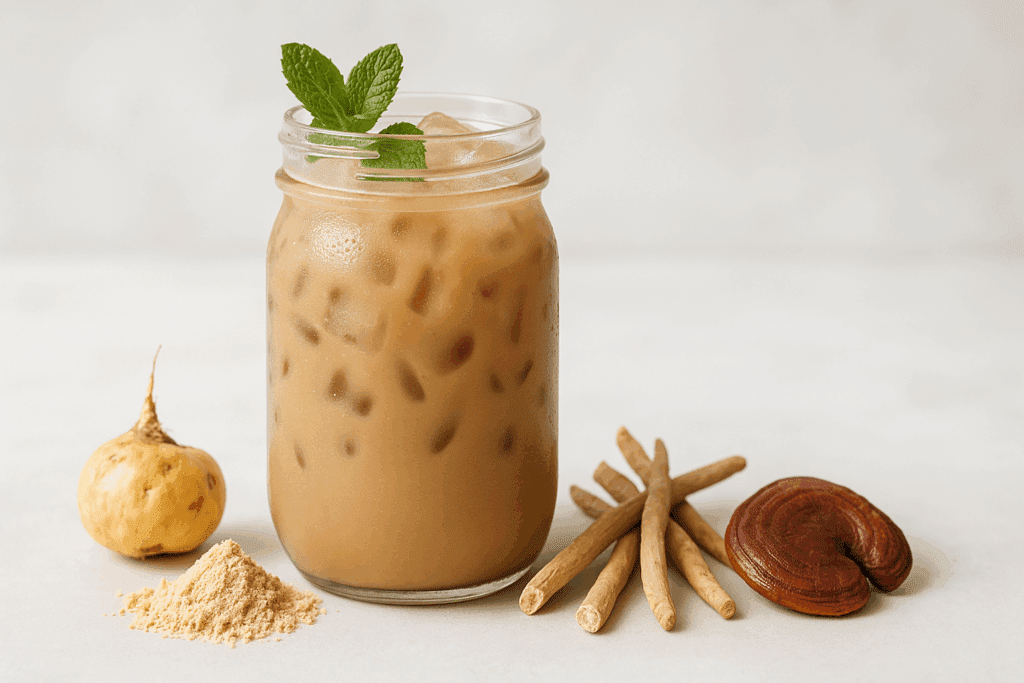
Healthy Caffeine Drinks That Support Adrenal Balance
Adrenal fatigue is a controversial but increasingly discussed phenomenon in health circles, often used to describe the body’s maladaptive response to chronic stress. While caffeine can temporarily boost energy, excessive or inappropriate use may exacerbate adrenal strain. To avoid this, the healthiest way to get caffeine is to combine it with ingredients that support adrenal health and overall endocrine function.
A good example of such a healthy caffeine drink is a mushroom coffee blend that includes reishi and ashwagandha. Reishi, often called the “mushroom of immortality,” supports immune function, regulates cortisol, and calms the nervous system. Ashwagandha is a potent adaptogen known for its cortisol-lowering effects. Together, they cushion the adrenal glands from caffeine’s stimulating impact.
Cold caffeine drinks can also be made healthier by incorporating adaptogens and reducing sugar. A cold brew infused with maca root and mint, for instance, offers refreshing energy while supporting hormonal balance. Avoiding sugary energy drinks and opting for beverages that prioritize clean ingredients and functional herbs makes a significant difference in how the body responds to caffeine.
What Has Caffeine Besides Coffee? Discovering Hidden Gems
Many people are unaware that caffeine exists in a wide variety of plants and beverages beyond the traditional coffee bean. This realization is essential for anyone looking to reduce dependency on coffee while maintaining alertness and performance. Green tea, matcha, yerba mate, guayusa, kola nut, and cacao are excellent examples of what has caffeine besides coffee.
These alternatives are often combined with antioxidants, L-theanine, or other calming compounds that provide a smoother energy profile. Matcha, in particular, stands out for its high concentration of L-theanine, which promotes alpha brain waves and counters the jittery effects of caffeine. This combination is ideal for achieving a meditative state of alertness and is widely used in traditional Japanese tea ceremonies for that very reason.
Kola nut, although less common in Western diets, is a traditional stimulant in African cultures and contains a unique profile of caffeine, theobromine, and tannins. Guayusa, native to the Amazon rainforest, offers an uplifting and balanced energy source with no bitter aftertaste. These lesser-known sources of caffeine provide functional benefits while offering variety and nutritional richness.
Best Way to Take Caffeine to Complement Stress-Relief Protocols
The integration of caffeine into a stress-relief regimen may seem counterintuitive at first glance. After all, caffeine is a stimulant, and stimulants are often associated with increased cortisol and sympathetic nervous system activity. However, when used thoughtfully and in conjunction with adaptogens, caffeine can complement stress-relief protocols rather than undermine them.
The key lies in pairing caffeine with compounds that modulate the body’s stress response. For instance, combining caffeine with L-theanine results in a synergistic effect that enhances cognitive performance while promoting relaxation. This pairing is found naturally in green tea, which explains its ability to invigorate without causing anxiety.
Moreover, the timing and context of caffeine consumption play crucial roles. Using caffeine strategically—such as before physical exercise or cognitively demanding tasks—can enhance performance while preventing unnecessary overstimulation. Avoiding caffeine during emotionally charged or stressful times, on the other hand, prevents the compounding of sympathetic nervous system activation.
Healthy Ways to Get Caffeine While Supporting Mental Health
For individuals prioritizing mental health, the healthiest caffeine options are those that offer cognitive and emotional support without overstimulation. In this context, beverages made with adaptogenic herbs, mushrooms, and clean caffeine sources are superior to conventional energy drinks and sugary coffee beverages.
Healthy drinks that have caffeine often include ingredients like holy basil, lemon balm, lavender, or passionflower, all of which support emotional regulation. For example, a chilled tea blend of green tea, lemon balm, and reishi can uplift the mood while reducing nervous tension. These healthy forms of caffeine offer a gentle boost without triggering the highs and lows that can destabilize emotional equilibrium.
Cold caffeine drinks can be made healthier by reducing artificial flavors, sweeteners, and additives. A homemade herbal matcha latte with oat milk and a touch of raw honey is an example of a balanced, nourishing option. It’s not just about caffeine content—it’s about the entire matrix of ingredients and how they interact with the body and mind.
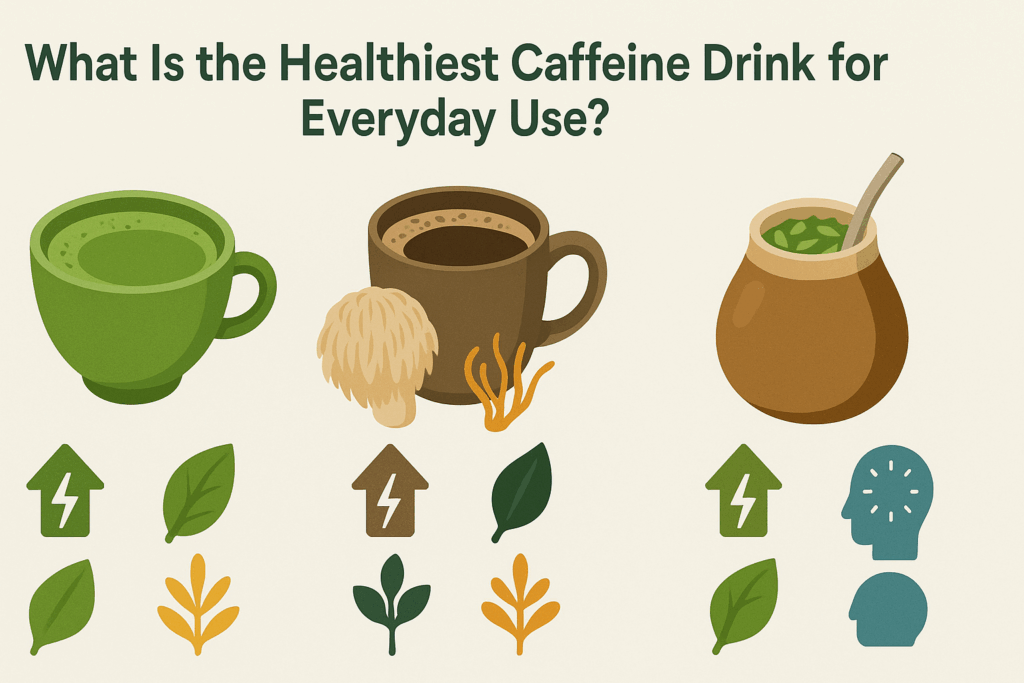
What Is the Healthiest Caffeine Drink for Everyday Use?
When evaluating the healthiest caffeine drink for daily consumption, several factors must be considered: source purity, caffeine content, synergistic ingredients, glycemic impact, and adaptogenic support. Based on these criteria, beverages like ceremonial-grade matcha, adaptogenic mushroom blends, and unsweetened yerba mate rank among the top.
Matcha, with its high concentration of catechins and L-theanine, provides sustained energy and cognitive clarity. Mushroom coffee blends containing lion’s mane and cordyceps offer neuroprotective benefits and stamina. Yerba mate delivers a broad spectrum of antioxidants and balanced stimulation. These drinks support cognitive performance, immune health, and emotional well-being, making them suitable for regular use.
It’s also important to vary one’s caffeine sources throughout the week to prevent tolerance buildup and dependency. Rotating between different healthy sources of caffeine—such as green tea on one day and cacao on another—keeps the body responsive while ensuring a diverse intake of beneficial compounds. Flexibility and mindfulness are key aspects of sustainable caffeine consumption.
Frequently Asked Questions (FAQ)
What is the best way to take caffeine for maximizing mental clarity without triggering anxiety?
The best way to take caffeine for mental clarity without exacerbating anxiety involves pairing it with adaptogenic herbs or nootropics that modulate the stress response. Many people benefit from combining moderate caffeine with L-theanine, an amino acid found in green tea, which smooths out caffeine’s stimulating effects. This combination promotes focus and calmness, especially when consumed in the form of health caffeine drinks like matcha lattes or adaptogen-infused teas. Timing also matters—morning consumption aligns better with circadian rhythms and reduces sleep disruption. Avoiding caffeine after 2 PM helps maintain healthy sleep architecture and prevents cortisol spikes that can mimic anxiety.
Are there any effective ways to get caffeine without drinking coffee?
Yes, there are several healthy ways to get caffeine without coffee, many of which are gentler on the digestive system and nervous system. Yerba mate, for instance, provides a smooth energy curve thanks to its rich blend of caffeine, theobromine, and theophylline. Another emerging option is guayusa, an Amazonian leaf that offers alertness without jitteriness. Dark chocolate, especially raw cacao, also offers a mild caffeine boost while delivering antioxidant benefits. For those seeking portable formats, matcha powder or caffeine-infused electrolyte sachets are convenient caffeine sources besides coffee. These alternatives help sustain energy without the acidity or dependency often associated with traditional brews.
How does adaptogenic support enhance the effects of healthy caffeine intake?
Adaptogens, when paired with healthy caffeine intake, buffer the stress-related side effects of stimulants and enhance the body’s resilience. Herbs like ashwagandha, rhodiola rosea, and eleuthero root modulate cortisol levels and prevent adrenal overstimulation, making them ideal companions to caffeine. These plants act as a stabilizing force, reducing caffeine-induced palpitations and mental overstimulation. For example, blending caffeine with adaptogenic mushroom elixirs such as cordyceps or lion’s mane can offer a steady, focused energy without the typical crash. This synergy creates one of the healthiest ways to get caffeine while also supporting long-term mental performance and immune resilience.
What drinks have caffeine besides coffee that also support stress relief?
Some of the most effective drinks with caffeine other than coffee are those that include herbal components with calming or adaptogenic properties. A few standout options include matcha green tea, which provides L-theanine for calm alertness, and yerba mate, which contains multiple stimulants that work synergistically for a balanced lift. Adaptogen-infused cold brews that contain reishi or lion’s mane are increasingly popular among wellness-focused consumers. Kombucha made from black or green tea also provides a mild caffeine dose along with probiotic benefits. These drinks qualify as healthy drinks that have caffeine and contribute to emotional balance as well as energy.
What is the healthiest caffeine drink for people with high stress levels?
The healthiest caffeine drink for those with elevated stress levels is one that incorporates both moderate caffeine and cortisol-regulating adaptogens. A prime example is a reishi or ashwagandha-enhanced matcha latte, which blends the calming effects of L-theanine with the energy lift of green tea. Functional beverages using lion’s mane mushroom for cognitive support and cordyceps for stamina are also considered excellent choices. These drinks offer a slow-release energy profile that’s less likely to spike cortisol or disrupt adrenal function. For those on the go, ready-to-drink health caffeine drinks that include calming herbs and avoid added sugars are among the healthiest forms of caffeine available today.
What are the best sources of caffeine for those who are sensitive to stimulants?
Sensitive individuals often do best with caffeine sources other than coffee due to the latter’s rapid absorption and acidic nature. Green tea and white tea are excellent alternatives, providing lower caffeine content and beneficial polyphenols. Matcha, although potent, is better tolerated due to its gradual absorption and high theanine content. Herbal options like guayusa and cacao offer additional mood benefits and minimal stimulant volatility. These represent some of the healthiest caffeine options because they promote focus and alertness without triggering a stress response, making them ideal for sustainable, healthy caffeine intake.
Exploring the Best Way to Take Caffeine Without Sacrificing Sleep Quality
Sleep quality can be significantly compromised by poor caffeine timing, regardless of the source. To achieve the best way to take caffeine while protecting deep sleep, it’s essential to monitor not just the dose but also the delivery method and co-factors. Pairing caffeine with adaptogens like holy basil or reishi can mitigate its impact on nighttime cortisol production. Cold-brewed teas or mushroom coffees tend to release caffeine more slowly and reduce the risk of overstimulation late in the day. Individuals should also consider genetic differences in caffeine metabolism, which can determine whether they need to stop intake by early afternoon or can tolerate later consumption without sleep disruption.
What has caffeine besides coffee that supports both energy and immunity?
A number of caffeine sources support immunity in addition to enhancing energy. Green tea, particularly matcha, contains catechins like EGCG that boost immune function while offering a stable caffeine release. Cordyceps mushrooms, often included in functional caffeine blends, support oxygen utilization and immune modulation. Cacao provides a modest caffeine dose along with magnesium and flavonoids that support heart and immune health. These healthy sources of caffeine allow for a dual benefit: enhanced performance and resilience to stress-related immune suppression. Choosing the best form of caffeine for immune support means selecting beverages that contain plant compounds known for both stimulant and therapeutic effects.
Healthy Caffeine Intake for High Performers: What Is the Best Way to Ingest Caffeine for Focus and Recovery?
High-performing individuals benefit from strategic caffeine use that promotes both cognitive performance and recovery. The best way to ingest caffeine for these dual goals often involves microdosing caffeine throughout the day in combination with adaptogens and electrolytes. For example, sipping on cordyceps tea in the morning and then transitioning to a lion’s mane cacao tonic in the afternoon supports both endurance and neuroplasticity. Some also rotate between healthy cold caffeine drinks, such as adaptogenic sparkling waters or mushroom-infused teas, to avoid tolerance buildup. This varied intake pattern helps sustain mental performance while preventing dependency, which aligns with maintaining healthy caffeine intake in the long term.
Which forms of caffeine other than coffee are being researched for their role in stress resilience and cognitive longevity?
Emerging research is focusing on caffeine sources besides coffee that show promise for enhancing brain longevity and stress resilience. Guayusa, a plant native to the Amazon, is gaining attention for its clean energy profile and antioxidant density. Similarly, green oat extract and certain adaptogenic mushrooms are being investigated for their synergistic effects when combined with low-dose caffeine. Functional beverages that blend these novel ingredients are reshaping how we define the best caffeine—not just by stimulant effect, but by long-term neurological support. The healthiest way to get caffeine may increasingly involve customized blends that integrate nootropics, adaptogens, and micronutrients for a more holistic performance boost.
Conclusion: Making Caffeine Work for You in a Stress-Relieving, Adaptogen-Supported Lifestyle
Ultimately, the best way to take caffeine for powerful stress relief and adaptogenic support is to move beyond mere stimulation and into the realm of strategic nourishment. Caffeine can be a powerful ally when used with intention, respect for the body’s rhythms, and a broader wellness strategy that includes adaptogens, nutrient-dense beverages, and emotional awareness. Choosing the healthiest way to get caffeine is not about deprivation or rigid avoidance but about making informed, supportive choices that align with your unique physiology and lifestyle demands.
From healthy caffeine drinks infused with reishi and lion’s mane to cold brew teas with soothing herbs and antioxidant-rich cacao, the modern landscape of caffeine consumption is both diverse and empowering. The integration of adaptogenic support provides a much-needed balance in an era of overstimulation and burnout, offering not just energy but resilience.
Whether your goal is sharper focus, emotional stability, or sustained physical energy, understanding the best way to take caffeine can be a transformative step. It allows you to harness this ancient compound’s full potential while honoring the complexity of your stress response system and mental well-being. In a world that often demands too much, caffeine—taken wisely—can be a form of self-care, strength, and sustainable vitality.
